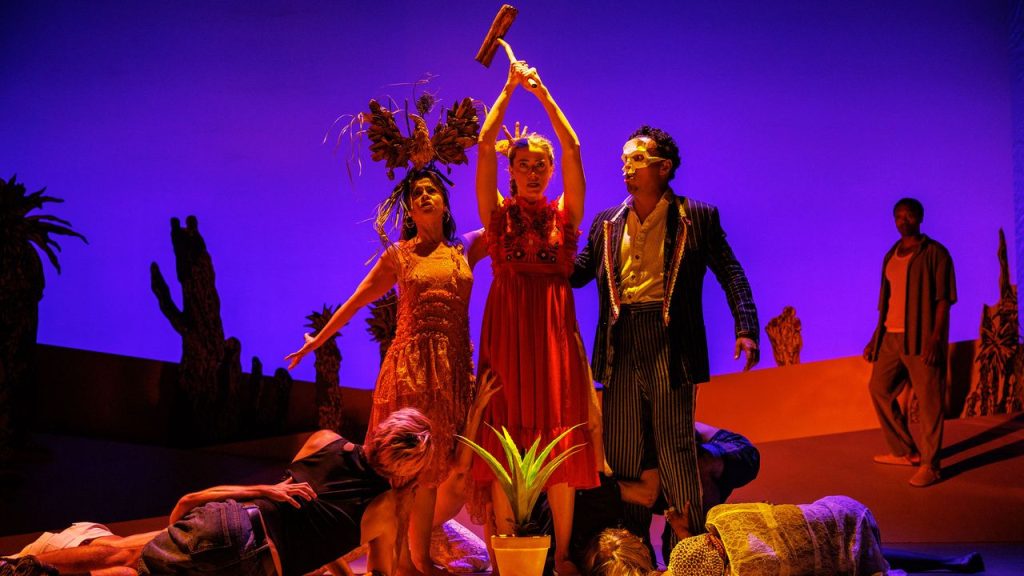Jeremy O. Harris, creative director of this year’s Williamstown Theatre Festival, decided to center his inaugural season on the works of Tennessee Williams. Why? “Because I am queer, Southern, and a playwright who enjoys a nice dinner and a better martini,” he wrote in an introductory letter this spring.
It’s a bold move to compare yourself to an epochal master—but an effective one, if the resulting work does seem intriguing enough to back it up. Pamela Anderson in a polarizing and understaged Williams play? Damnit, Jeremy—of course I’d like to see that. So, for the first time ever, I took the three-plus-hour trek from New York City to western Massachusetts for this year’s festival. And, well, Harris pulled it off, crafting one of the most indelible weekends of theater I can think of—headlined by his own new play, Spirit of the People, as well as the Williams deep cuts Camino Real and Not About Nightingales.
The scene was Williams as seen through Harris, a Warholian disciple, with many of his friends, collaborators, and Instagram mutuals along for the ride. Slave Play alumni including director Robert O’Hara figured into the festival’s programming, alongside would’ve-been Factory superstars like Anderson, Amber Heard, and Nicholas Alexander Chavez (best known for Ryan Murphy’s Menendez brothers series). Harris’s genius here is in digging beneath the initial gag of casting glossy tabloid types—upending our expectations for these performers while still relishing in their glamour, just as Williams was wont to do. The festival was teeming with done-up gays whose Aspen to SoHo jet-setting would normally never allow for this type of detour, mingling with Teva-toed New England elders investigating whether this year’s glitz would live up to the standard summer stock.
For me, it did, starting with Friday night’s presentation of Spirit of the People. Critics are being asked not to review the production in its current state, so I’ll just say this: while it is not yet a great play, it is a very strong one. And Harris is not merely aping Williams: This is contemporary theater that honors its past while engaging its present, a messy work that got me genuinely excited. It also contained the weekend’s biggest surprise: Amber Heard’s command of the stage, exceptional particularly for someone in her professional theatrical debut. As one of the rangy, often surreal play’s three emotional anchors, her character is cut from the same cloth as Blanche DuBois and her ilk: a torrid backstory, a thinning grasp on reality. Heard is not only eloquent and beautiful (and fluent in Spanish), but embodies the fragility and resilience of a classic Tennessee Williams heroine.
The piece, which runs some three hours and fifteen minutes, also features the up-and-comer Tonatiuh—whose fierce presence grounds even the play’s, ahem, zanier bits—and Ato Blankson-Wood, one of our finest working stage actors, pulling off the rare feat of playing both a narrator-cypher and a fleshed-out human being. Once again, he gets to share the stage with the excellent James Cusati-Moyer, who played his boyfriend in Harris’s Slave Play; Blankson-Wood also reappears in Williams’s Camino Real, in a brief but emotionally walloping scene.
Many performers from Spirit’s large cast also appear in Camino, Williams’s prophetic 1953 fever dream about American indifference to imperialism, migration and cultural decline. Director Dustin Wills wrangles its huge ensemble with the big-picture emotions of an opera producer and the big-tent commitment of a carnival barker, without sacrificing thematic potency. This play is Williams at his most experimental: while his characters are famous for being at the end of their rope, here he envisions the entire country at its literal final crossing. As the coughing heroine Camille, a game Anderson is matched in archetypal Williams perfection by Chavez, playing the all-American phantom Kilroy.

